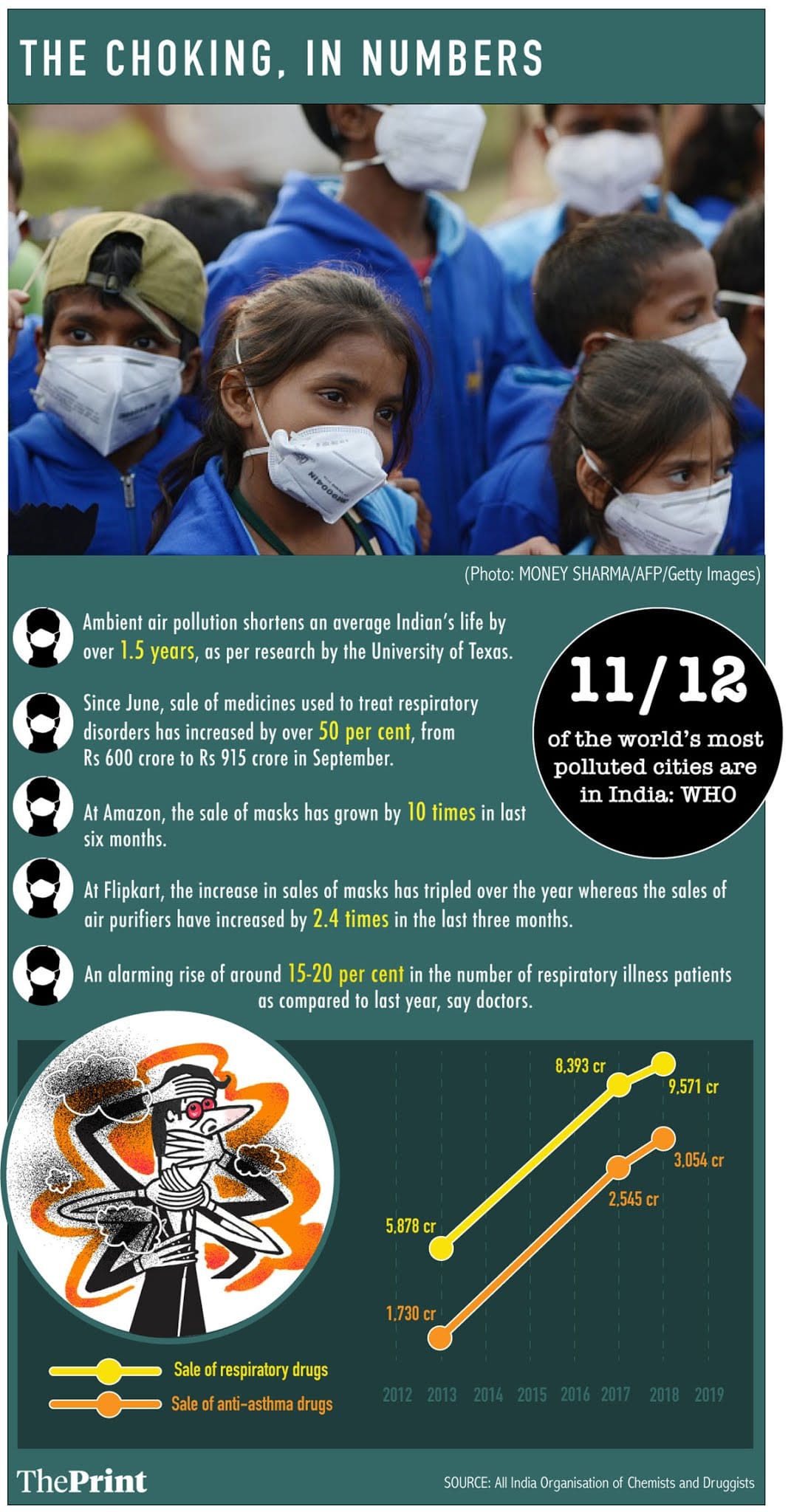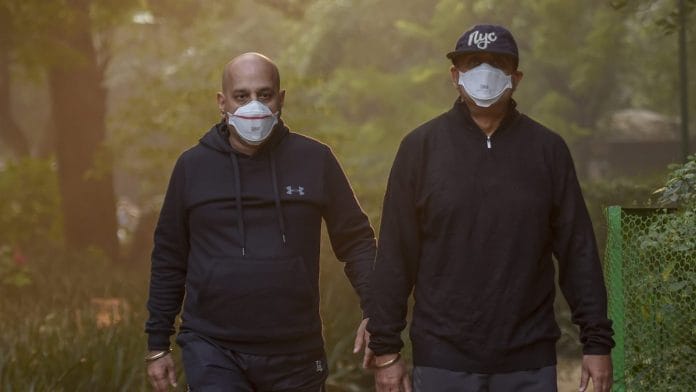The sales of respiratory drugs, air purifiers and masks have seen a drastic surge in the past few months due to the poor ambient air quality amid the festivities.
New Delhi: This festive season, it is not only the sale of sweets, jewellery and apparel that is skyrocketing.
The continuous fall in the air quality index has led to a drastic surge in the sale of drugs used to treat respiratory disorders, air purifiers and face masks across the country.
Since June alone, the sale of medicines used to treat respiratory disorders — anti-asthma drugs, antibiotics, anti-allergens, nasal drops among others – have increased by over 50 per cent, as per data with the market research wing of the All India Organisation of Chemists and Druggists, AIOCD- AWACS.

The data shows that the sale of anti-respiratory illness drugs rose to Rs 915 crore in September from Rs 600 crore in June — a jump of more than 50 per cent.
The overall picture too makes for grim reading.
Over the past year, the sale of these drugs rose by 14 per cent, to Rs 9,571 crore this September from Rs 8,393 crore in September 2017. The sales have also increased by 63 per cent in the last five years — they stood at Rs 5,878 crore in September 2013.
Of these drugs, the sale of anti-asthma medicines has increased by over 77 per cent in the last five years — to Rs 3,054 crore this September from Rs 1,730 crore in September 2013. The category also grew by 20 per cent from Rs 2,545 crore in 2017.
The sale of other respiratory drugs such as systemic anti-histamines, nasal drops, chest balms and inhalants have almost doubled.
Chest rubs and inhalants, for instance, have grown by over 100 per cent in the last year – to Rs 47.4 crore this year from Rs 21.4 crore in September 2017.
Also read: India’s poisonous air is harming children — both born and unborn
A scamper for masks, purifiers
It is not just the sale of drugs that have seen a spike. E-commerce portals and regular brick and mortar stores say that there has been a marked increase in the sale of air purifiers and face masks.
Amazon India says in the last three months, it has sold 6.5 times more masks than it usually does in this period. It also says that the sale of masks has risen 10 times in the last six months.
The company says that much of the demand is from the Delhi-NCR region.
The e-commerce giant has also sold 4.5 times more air purifiers in October than it did in September. Buoyed by the numbers, Amazon has begun delivering air purifiers, for select customers, in merely two hours of them being ordered.
At Flipkart, the increase in sales of masks has tripled over the year whereas the sale of air purifiers has increased by 2.4 times in the last three months.
Both portals, however, did not share the absolute increase in sales.
The demand has also been reflected in regular pharmacy stores.
“People want full-face riding masks, anti-pollution masks, designer face masks, half face mask, disposable anti-pollution masks at an average price of Rs 150-200,” said a salesman at Amrit Pharmacy, a drug store outside Ram Manohar Lohia Hospital in central Delhi.
“Until last year, most of the demand was driven by foreigners or patients suffering from diseases such as asthma, HIV and tuberculosis but now we are selling 30-50 masks every day for children and fit-looking youngsters.”
Also read: Exercise, food & plants: Best ways to prepare your body and home to fight India’s toxic air
Worst is yet to come, say doctors
With Diwali, doctors say the cases of people suffering from respiratory disorders will only increase.
“Pollution is definitely having an adverse impact on patients of all age groups. There’s an alarming rise of around 15-20 per cent in the number of patients as compared to last year,” said Dr Rajesh Chawla, senior consultant (critical care, pulmonary and sleep disorders) at Indraprastha Apollo Hospitals. “The cases are likely to increase after Diwali.”
Chawla said that asthmatic patients, particularly those suffering from chronic obstructive pulmonary disease (COPD), are coming in with acute attacks.
“The condition of asthmatic and COPD patients worsens during this time,” Chawla said. “Many of my patients complain that when they travel outside India, their condition gets better and they don’t need medicines. But on coming back, their condition worsens again.”
Medical practitioners have been prescribing nebulisers and respiratory drugs for treatment, while masks are advised in general as a precautionary measure.
“Over 5 million workers wear respirators in 1.3 million workplaces throughout the United States. So, it is an established fact that face masks do help prevent damage from particulate matter,” said Dr K.K. Aggarwal, former national president of Indian Medical Association.






